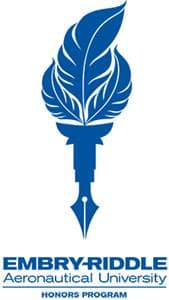The Embry-Riddle Honors Program consists of at least 24-27 credit hours of Honors. These requirements are embedded in (not added to) the existing curriculum:
- 12-13 credit hours applicable to General Education requirements
- At least 12-14 credit hours within the student’s major.
General Education
The Honors curriculum emphasizes an interdisciplinary approach to education by requiring students to enroll in three three-credit hour seminars (nine credit hours total) that encourages a global perspective and places disciplines in dialogue.
The seminars are capped at 24 students (all members of the Honors program), are discussion based, and focus on developing students’ communicative, critical, research and leadership skills, and require text and web-based original research, written essays, and oral presentations.
Honors Seminars
The Honors Seminars are unique courses, created specifically for the Honors Program. Students may experience courses such as these:
- The Science of Stories
- Disruptive Technologies
- Regeneration or Degeneration: The Scales Weighted for Our Future
- Archaeologies of the Future: Science and Science Fiction
- Science and Society: The Ethics of Sustainability (this can replace the “Ethics of Sustainability” course already listed)
- Cold War Paranoia and Products
- Video Game Topography: Investigating Games with a Sense of Place
- Tariffs, Trade Wars, and Tweaking the System: The Transnational Economy
- Colonialism and Globalization
- Nationalism in the Middle East and Africa
- The Culture of Computing
- The Nature of Creativity
- Chaos and Design
- Vietnam in World History
- The Arts of Persuasion
- From Humanism to Transhumanism
- American War Drums and Persistent Echoes
- Ancient and Modern Conceptions of the Hero
- The Cold War
- Experiences of the “Other” in American Culture
- U.S. Diplomacy in a Troubled World
- Structure and Expression of American Government: Current Issues
- Politics and the Fear of Science
- Globalization and Fundamentalism
- Climate Change
- Good Government
- The Future
- Ironies of Control
- The Silk Road
- The Ethics of Sustainability
- The Holocaust
- Water
- The Nature of Consciousness
- Social Media
- The American Melting Pot
In lieu of the third Honors seminar, students may select an independent study or travel abroad option, the specifics of which are subject to approval by the Honors director.
Honors Within the Major
Individual degree programs establish, in coordination with Honors Program administration, the appropriate Honors experience in the major. A degree program may designate sections of particular upper-level (300-400 level) courses within the majors as “Honors” when there is a sufficient number of Honors students within the major to support them. Programs which enroll only a small number of Honors students identify specific courses or individual projects undertaken with a faculty mentor, in order to satisfy the Honors experience. The Honors experience within the major may involve completion of an Honors senior thesis, senior project, or senior portfolio.
Individualized Honors Contracting
Honors Program students often arrange individualized projects with faculty, in order to add depth to or to go somewhat outside the required curriculum. Here are a few examples of some actual Honors contract experiences.
- Nicole Kufa, with Dr. Richard Snow: WX 299, WX 399 — Research about lightning patterns as indicators of potential tornado development within thunderstorm cells. Research led to co-presentation of “Lightning: Meteorology’s New Tool” at the American Meteorological Society meeting.
- Jefferson McMillan, with Professor Glenn Harmon: AS 354 — Research into the validation of FAR 91.211 requiring use of oxygen for crewmembers after 30 minutes between altitudes of 12,500 and 14,000 feet. Faculty from various departments were involved in this time intensive study. The findings were submitted to the Federal Aviation Administration.
- Michael Nayak, with Dr. Hamilton Hagar: AE 699 — Student completed a one-on-one graduate level independent research into low-energy trajectory planning using chaos theory and the “Interplanetary Superhighway” concept and produced a 180-page thesis-level report. This project led him to the jet propulsion lab where he worked with leading scientists in this field.
- Zoe Cunningham, with Professor Greg Zahornacky: AS 472 — Student gave a class presentation on sexism in the workplace, specifically in the aviation field and at Embry-Riddle Aeronautical University.
- Mariah Law, with Dr. Ted von Hippel: PS 399 — The student is developing a new approach to studying exoplanetary atmosphere by creating artificial neural networks that have the capability to classify exoplanets using pre-existing models of exoplanet spectra. This research will lead to a manuscript for publication.
- Patrick Metzger, with Dr. Frederick Mosher: WX 270 — Student built a 19th century Weather Bureau Meteograph and used it to gather data in various locations. The instrument responded to atmospheric changes with enough accuracy to be deemed functional. The Weather Kite that was also built was able to become airborne and carry the meteograph for short periods of time.
Contact Us
Daytona Beach, Florida 32114
Catalog
For more information on courses and dates, check out the Daytona Beach Campus Catalog.

